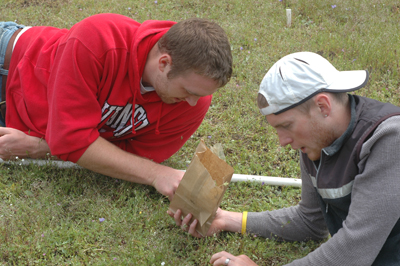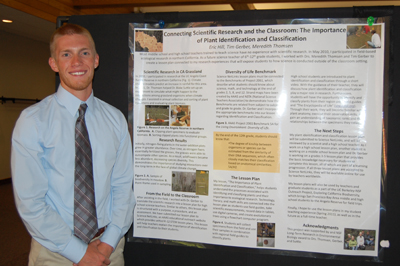Posted 2:14 p.m. Thursday, March 22, 2012
UW-La Crosse climate change research in California is a model for how college students can be both great researchers and produce great resources for K-12 science teachers.
 [/caption]
UW-La Crosse climate change research in California is a model for how college students can be both great researchers and produce great resources for K-12 science teachers.
For the last three years, a group of UW-L secondary science education and biology majors have traveled during the summer to coastal mountain ranges of California to study how climate change affects the biodiversity of grasslands. Along with two faculty members, they are comparing how two climate change scenarios — from two different climate models — differ in their effects on the natural ecosystem of the grassland.
While this experiment helps UW-L students gain a better understanding of the scientific process, climate change and ecology, it’s also helping middle and high school teachers and students across the country learn about these same topics. Education students translate different aspects of the experiment into lesson plans, which are peer reviewed and then distributed on the Internet.
“It was a really interesting way to see how we could take scientific research and apply it to an education field through project-based learning,” says Eric Hill, who graduated in May and is now a teacher at Waukesha (Wis.) North High School.
Hill, who majored in biology and education, says he’s glad to be part of improving science education. The work has also helped him become a better teacher. He used the lesson plans he created at UW-L his first year of student teaching at Westby (Wis.) Area High School. He plans to continue to use them this year teaching biology in Waukesha. From his research experience, he knows how to translate a large-scale research experiment into a class project and he can better communicate science topics from evolution to ecology, having experienced them in the field.
“You have something you are passionate to talk about and can answer from experience,” he says “Kids kind of look up to you because you did the research and you can make the personal connection.”
Research has shown that a teacher’s research experience lends itself well to educating students. A 2009 Columbia University study found that students whose teachers participated in research had a 10 percent increase in their score on the science section of the NY State Regents exam.
[caption id="attachment_10542" align="alignright" width="400" caption="UW-L student Eric Hill presents the climate change research at a summer poster session."]
[/caption]
UW-La Crosse climate change research in California is a model for how college students can be both great researchers and produce great resources for K-12 science teachers.
For the last three years, a group of UW-L secondary science education and biology majors have traveled during the summer to coastal mountain ranges of California to study how climate change affects the biodiversity of grasslands. Along with two faculty members, they are comparing how two climate change scenarios — from two different climate models — differ in their effects on the natural ecosystem of the grassland.
While this experiment helps UW-L students gain a better understanding of the scientific process, climate change and ecology, it’s also helping middle and high school teachers and students across the country learn about these same topics. Education students translate different aspects of the experiment into lesson plans, which are peer reviewed and then distributed on the Internet.
“It was a really interesting way to see how we could take scientific research and apply it to an education field through project-based learning,” says Eric Hill, who graduated in May and is now a teacher at Waukesha (Wis.) North High School.
Hill, who majored in biology and education, says he’s glad to be part of improving science education. The work has also helped him become a better teacher. He used the lesson plans he created at UW-L his first year of student teaching at Westby (Wis.) Area High School. He plans to continue to use them this year teaching biology in Waukesha. From his research experience, he knows how to translate a large-scale research experiment into a class project and he can better communicate science topics from evolution to ecology, having experienced them in the field.
“You have something you are passionate to talk about and can answer from experience,” he says “Kids kind of look up to you because you did the research and you can make the personal connection.”
Research has shown that a teacher’s research experience lends itself well to educating students. A 2009 Columbia University study found that students whose teachers participated in research had a 10 percent increase in their score on the science section of the NY State Regents exam.
[caption id="attachment_10542" align="alignright" width="400" caption="UW-L student Eric Hill presents the climate change research at a summer poster session."] [/caption]
Because UW-L’s research has much broader impact beyond the scientific community, the project’s faculty leaders — Biology Professors Tim Gerber and Meredith Thomsen — were able to secure a National Science Foundation grant to support their research over the next three years and bring more students on board. And now, with support from the UW-L College of Science and Health, the project is expanding again. A total of eight UW-L students will go this summer — up from six last year. When those students graduate, like Hill, they’ll step in front of the classroom with some real research experience to share — continuing to broaden the impact.
“Over a 30-year career as a high school teacher, you have thousands of students,” says Gerber. “You are providing them with a stronger content base and showing them this is what scientists actually do.”
[/caption]
Because UW-L’s research has much broader impact beyond the scientific community, the project’s faculty leaders — Biology Professors Tim Gerber and Meredith Thomsen — were able to secure a National Science Foundation grant to support their research over the next three years and bring more students on board. And now, with support from the UW-L College of Science and Health, the project is expanding again. A total of eight UW-L students will go this summer — up from six last year. When those students graduate, like Hill, they’ll step in front of the classroom with some real research experience to share — continuing to broaden the impact.
“Over a 30-year career as a high school teacher, you have thousands of students,” says Gerber. “You are providing them with a stronger content base and showing them this is what scientists actually do.”
